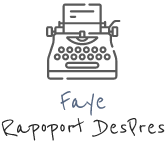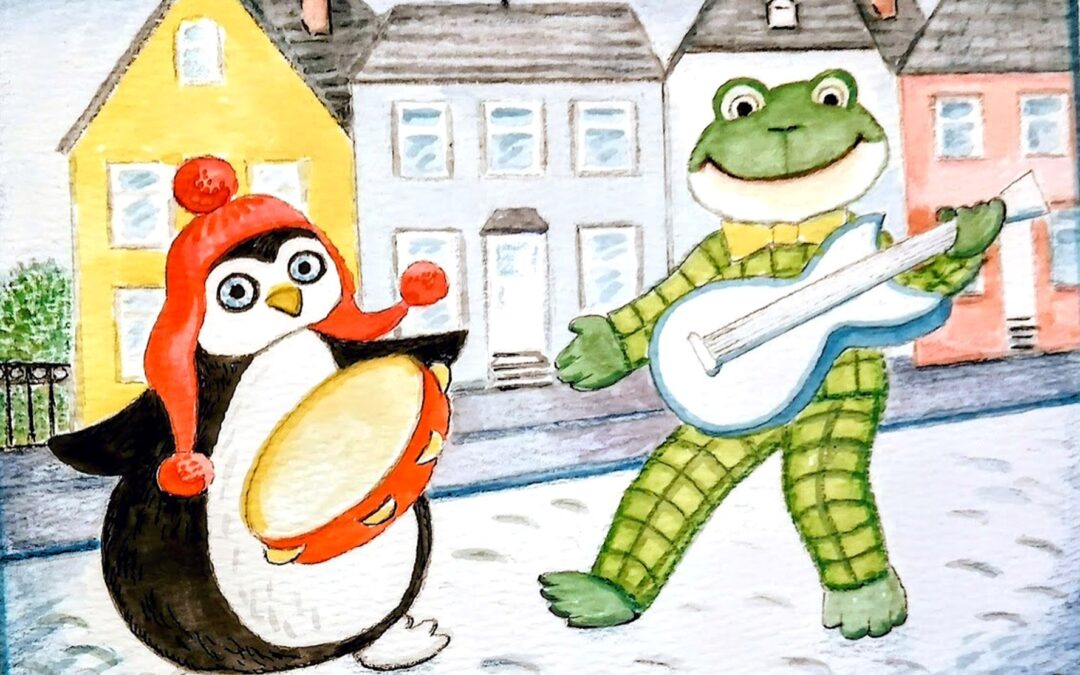Above: A detail of some of the artwork by Anya Lauchlan in Toys at Night.
I once dated an Olympic skier. The relationship was brief, but during that short time I experienced the kind of infatuation we are susceptible to in our youth — the kind that causes you to make stupid decisions, sometimes forgetting there are people in front of you who actually care and are shaking their heads.
I did learn a few things from the experience, however. One was that Olympic and professional athletes can tend towards having a certain ego. It makes sense; you’d have to have both talent and a strong ego, I imagine, to reach that level of skill and success. Not everyone I’ve dated could hop onto their backyard trampoline and do a double-twisting back layout just for fun. It’s downright impressive.
But once, when I was a bit frustrated with what I perceived as a slight, I said, “For heaven’s sake, all you do is slide down a mountain on two sticks!”
The comment was ridiculous, of course. Anyone who has ever skied, including me, knows there is a lot more to it than sliding down a mountain on sticks — especially if you’re skiing in the Olympics. I have nothing but admiration for that accomplishment, especially having once been a gymnast with dreams of reaching a higher level.
But the truth I was trying to get at, and that I’m trying to get at now, is that regardless of our level of “success” in the eyes of the world, we are all important and worthy of respect – and so is our work. Even during that time in my life, when I battled insecurities, a voice from my gut broke through the noise. I didn’t like someone talking to me as if I were “less than.” (To be fair, he was not a bad person at all. We were young.)
A similar thing happened when I was even younger. I spent a summer working at Tanglewood with the Boston Symphony Orchestra. During my tenure, I was in the presence of many famous musicians. I once sat in an empty rehearsal auditorium and watched Leonard Bernstein show a student how to really conduct an orchestra. I held the door open for Yitzhak Perlman. Yo-Yo Ma seemed particularly kind. None of these musicians would remember me a moment after our paths briefly crossed, but none treated me with a lack of respect.
But there was one student conductor (who later made his professional debut with a photo and feature in the Arts section of The New York Times) who talked down to the staff. He barked orders, expressed impatience, and clearly thought quite a lot of himself. I’m sure he could tell by my attitude that I didn’t appreciate the way he talked to me. I think I even once told him to “cool it.”
One night, rain was pouring down after a concert. I was walking past a VIP parking lot and noticed this student conductor and his girlfriend next to his car. He was kneeling on the ground in the rain, looking with some desperation at his tire, which was flat. As I walked past, our eyes met. I hate to admit it, but I think I smiled. (Karma, you know.)
Moments like that have come and gone throughout my life. Maybe that’s why I have a bit of a chip on my shoulder when it comes to the idea of “importance” among writers and related to their work. Don’t get me wrong, I’ll be the first to acknowledge a high level of craft, and some well-known writers are wonderfully skilled. Sometimes their work is truly admirable, and maybe it’s even quite important. It can make readers think and can invite them to consider how the world is experienced by others.
But every writer’s work is important, because we wouldn’t spend our time doing it if it didn’t matter to us and if we didn’t hope it might help or touch – or even just entertain — someone else. And all writers, no matter how well-known or not, are just human beings. Some are nicer and more welcoming than others. So, when more well-known or connected writers occasionally treat me as “less than,” that voice still bubbles up inside me that says, “Cool it.”
So OK, yes, I do have a chip on my shoulder. I’m standing here ready to do battle. Maybe the project of me could use a little more work.
In that case, let’s get to what really is important. My latest book — my second collaboration with European artist Anya Lauchlan (whose extensive life’s work is deservedly celebrated) — is the children’s book, Toys at Night. The book is not on any best-seller lists. It’s not in the running for any awards that I know of, and I don’t think Travis Kelce will be inviting me to appear on his podcast. The book isn’t even on Amazon (for a number or reasons), and it is more available in the U.K. and Europe than in the United States. But it is a beautiful book that numerous people — most of all Anya — poured their hearts into with donated time. It is important because it was developed to bring some happiness to children in hospitals, kindergartens, and primaries in Ukraine, and its sale is also benefiting the Mountbatten hospice charity in the U.K. and a U.S. charity that helps stray and abandoned animals and families having trouble getting pet supplies in Ukraine.
I hope the fables in the book will help the children who read it know that they are important, whoever they are, and that the way we treat others is important, too.
So now I’ll get off my soapbox and return to my appropriate place of relative obscurity and let the book — the work — shine for itself. For more information about Toys at Night, visit www.goldfishbooksuk.com or email contact@goldfishbooksuk.com (note: the U.K. website can only take orders for the U.K. or Europe — if you are a bookseller in the U.S. or an individual who wants one of the few copies available in the United States — only 30 left as of this writing — you can send a message through this website or my books’ Facebook page).
Thank you!


What a great blog post, Faye. I could truly relate, and I learned some things about you! I can’t wait to get your new book.
Hi Faye.
Toys at Night is now listed almost everywhere including Amazon.
It takes a little time for the news to spread.
Gardners the main supplier of books in UK/Europe are now involved.
I am optimistic.